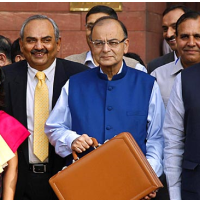Jaitley’s Budget Targets Black Money Overseas, But Domestic Cash Economy Remains Bigger Concern
 Finance Minister Arun Jaitley (centre) before presenting the Budget on Saturday (photo: Reuters)
Finance Minister Arun Jaitley (centre) before presenting the Budget on Saturday (photo: Reuters)
In his first full Budget, Finance Minister Arun Jaitley announced plans on Saturday for a tough new law to tackle black money with imprisonment up to 10 years and 300% penalty on tax for concealing income and assets abroad.
This is the highlight of the Budget and was perhaps influenced by public pressure and the BJP’s own political narrative ahead of the Lok Sabha election last year.
The tough measures proposed under this law include jail up to 10 years for concealment of income and assets and evasion of tax in relation to foreign assets, and penalty at the rate of 300% of tax. And not filing returns or inadequately disclosing foreign assets in those returns could result in seven years’ rigorous imprisonment. Jaitley wants to make these offences non-compoundable, with offenders not being permitted to approach the Settlement Commission.
What is remarkable is the degree of harshness that the Narendra Modi government plans to impose as part of its attack on black money. Undisclosed foreign bank accounts or offshore properties could lead to instant arrest as these reported assets would lead to punishment under the Prevention of Money Laundering Act.
The tax authorities would also be empowered to attach local properties and bank accounts, equivalent to the value of unreported foreign assets.
"Tracking down and bringing back the wealth which legitimately belongs to the country is our abiding commitment," Jaitley said.
His tough talk is seen as aimed at blunting criticism that the government has been dragging its feet on the issue of black money.
But the new law has also raised fears that it would put unbridled powers in the hands of enforcement agencies.
“While the intent is right, we hope the government does not impose a police raj. It revives memories of FERA days,” Dilip Lakhani, a senior Mumbai-based chartered accountant, told the Economic Times.
“The black money law is draconian with imprisonment even for minor transgressions, and it will be a source of harassment. It will also turn out to be ineffective in the absence of sophisticated information gathering systems,” said Mohandas Pai, former finance head of Infosys.
Manish Tewari, senior Congress leader and Supreme Court lawyer who deals in tax matters, said, “It’s simply the re-introduction of FERA. It is, in fact, far more draconian than FERA. It is going to put a huge amount of power in the hands of the Enforcement Directorate, which is really not known for its outstanding probity. But the fundamental question is: If you are sincere in your intention to unearth black money, why this distinction between black money stashed abroad and in India?”
The government plans to bring in a separate bill to deal with domestic black money, primarily through ‘benami’ transactions in real estate. It will allow for confiscation of ‘benami’ properties – registered in the name of another party – and provide for prosecution. The Finance Bill also plans to prohibit payment or receipt of cash advances of Rs 20,000 or more for the purchase of immovable property.
These measures may be aimed at reducing cash transactions in real estate, but could end up only scratching the surface. Cash changes hands in all real estate transactions, not just in ‘benami’ properties. The government may succeed in targeting ‘benami’ properties, but this is not likely to stop the black money swirling around the real estate market. Nor is it likely to make any dent in the huge amount of black money in the economy – estimated at Rs. 14,958 crore ($2.3 billion).
Targeting black money stashed overseas is a good start, but the draconian measures proposed may only encourage further corruption. And to succeed in its drive against black money, the government needs to stamp it out domestically first – in the real estate sector as well as in the small cash transactions that take place every day that small traders fail to report.
That is a much larger problem – think hundreds of thousands of crores – than simply sending a few business leaders to jail for stashing their crores abroad.
- Karan Singh
To Learn More:
Budget 2015: Black money abroad? Be ready for 10 years of rigorous imprisonment, huge fines (by Sugata Ghosh, Economic Times)
Budget 2015: Modi govt unleashes war on black money like never before (by N Madhavan, Firstpost)
Budget: Black money laws give unbridled power to agencies, Oppn wary (Hindustan Times)
Budget 2015: One-time chance on black money or 10 yrs in jail (by Sidhartha Gupta and Surojit Gupta, Times of India)
Illegal Cash Inside India is 3 Times that Stashed in Swiss Accounts (by Karan Singh, AllGov India)
- Top Stories
- Controversies
- Where is the Money Going?
- India and the World
- Appointments and Resignations
- Unusual News
- Latest News
- India College Chain’s Expansion into U.S. Draws Opposition from Massachusetts Officials over Quality of Education
- Milk Shortages in India Tied to Release of New Movies Featuring Nation’s Favorite Stars
- Confusion Swirls around Kashmir Newspaper Ban in Wake of Violent Street Protests
- Polio-Free for 5 Years, India Launches Vaccine Drive after Polio Strain Discovery
- New Aviation Policy Could Increase Service, Lower Ticket Prices






Comments